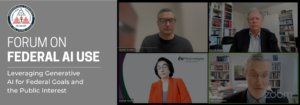Artificial Intelligence (AI) has emerged as a transformative force across various sectors, and the public service domain is no exception. Governments around the world are harnessing the power of AI to enhance service delivery, improve efficiency, and make data-driven decisions. In this blog, we will explore the benefits, risks, and what to expect in the future of AI in public service, all in a conversational tone.
The Benefits of AI in Public Service
Enhanced Efficiency: AI-powered automation can streamline bureaucratic processes, reducing the time and effort required to complete tasks. For instance, chatbots can handle routine inquiries, freeing up human resources for more complex tasks.
Data-Driven Decision-Making: AI can process vast amounts of data to extract valuable insights. Government agencies can use these insights to make informed decisions, allocate resources effectively, and address pressing issues more efficiently.
Improved Public Services: AI can optimize the delivery of public services. For example, predictive analytics can help healthcare agencies allocate resources to areas with the highest disease risk, leading to better public health outcomes.
Cost Reduction: Automation through AI can lead to significant cost savings in the long run. Fewer manual processes and errors mean that public resources are used more efficiently.
Risks and Challenges: While AI holds immense promise, it also presents certain risks and challenges:
Bias and Fairness: AI algorithms can inherit biases from the data they are trained on, potentially resulting in unfair or discriminatory outcomes. Public sector AI systems must be carefully designed and monitored to mitigate this risk.
Privacy Concerns: Handling sensitive citizen data is a central part of public service. AI’s capacity to analyze vast datasets raises concerns about data privacy. Striking the right balance between data utilization and privacy protection is a challenge.
Accountability and Transparency: AI decisions can be complex and opaque. Ensuring accountability and transparency in AI systems is crucial, especially when they impact citizens’ lives or rights.
Job Displacement: The automation of certain tasks through AI may raise concerns about job displacement among public sector employees. Effective strategies for workforce reskilling and retraining are essential.
The future of AI in public service holds exciting possibilities:
Advanced Automation: As AI technology matures, we can expect even more sophisticated automation, enabling governments to optimize operations and deliver services more efficiently.
Personalized Services: AI can be used to tailor public services to individual citizens’ needs, providing a more personalized experience and enhancing citizen satisfaction.
Enhanced Healthcare: AI will play a significant role in healthcare, from diagnosis to drug discovery. We can expect improved patient care and outcomes.
Smarter Resource Allocation: Governments will use AI to allocate resources more intelligently, responding to crises and managing public infrastructure with greater precision.
Ethical AI: The future will see a stronger emphasis on ethical AI development. Governments will implement guidelines and standards to ensure fairness, accountability, and transparency in AI systems.
AI in public service is not a distant dream; it’s a reality that’s unfolding before our eyes. While it promises enhanced efficiency, improved services, and cost savings, we must also remain vigilant about the associated risks and challenges. Ensuring ethical AI development and addressing issues like bias, privacy, and transparency will be crucial. In the future, AI will continue to revolutionize public service, making it more citizen-centric, data-driven, and responsive to the needs of society. As AI evolves, so will our capacity to provide better public services and governance.







